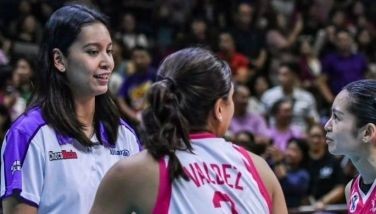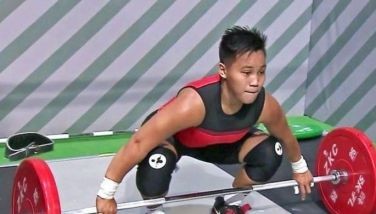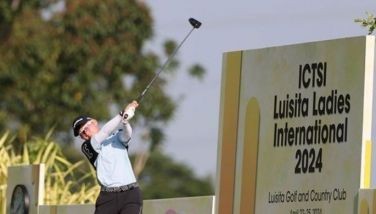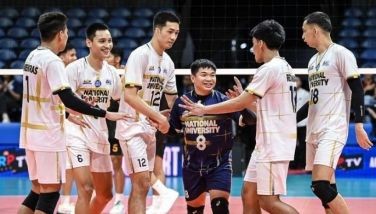Romasanta says it’s time to plan
MANILA, Philippines - POC first vice president and the country’s Rio Olympics chef de mission Joey Romasanta said recently there is reason to be upbeat in the development of sports with President Duterte’s support but stressed now is the time “to plan to plan” for a strategy to bag the elusive Olympic gold medal in Tokyo in 2020.
“We’re hopeful we’ll do better in 2020,” said Romasanta. “We’ve got four years to plan. It looks like we’re finally on track to build a Philippine Olympic Village which will be our National Training Center. In Rio, Cong. Peping (POC president Jose Cojuangco, Jr.) signed a Memorandum of Agreement with the Japan Olympic Committee for an exchange program where our athletes will be given access to the Ajinomoto National Training Center in Tokyo. Cong. Peping is excited about bringing over medical technology and sports science that Brazil used to maximize the performance of athletes in Rio. It’s about giving us an extra edge in competition.”
Romasanta said he couldn’t ask more from the Philippine delegation of 13 athletes in Rio. “Magagaang dalhin, masasaya, masusunurin and very disciplined,” he said. “In terms of commitment and dedication, I grade them a 10 in a scale of 1 to 10. In terms of conditioning, maybe, it would be a 7. As for actual performance, I leave that up to the NSAs to grade. IOC president Thomas Bach himself mentioned it is now more difficult than ever to win an Olympic medal with standards so high all over the world. What makes us optimistic is some of our Rio Olympians are young and they will improve four years from now.”
In Rio, 78 countries claimed at least one bronze medal while 119 failed to land a podium finish. The Philippines ranked No 69 with a silver medal. Austria showed up with 71 athletes in 22 sports but brought home only a single bronze medal to finish No. 78. Hong Kong was represented by 37 athletes in nine sports, Angola 25 athletes in seven sports, Cameroon 24 athletes in six sports, Peru 29 athletes in 11 sports and Kyrgyzstan 19 athletes in six sports but none of those countries had a medal. The Philippines sent 13 athletes in eight sports.
The youngest Rio Olympians in the Philippine lineup were Miguel Tabuena of golf and Ian Lariba of table tennis, both 21. The oldest was long jumper Marestella Torres, 35. The others in the cast were boxers Rogen Ladon, 22, and Charly Suarez, 28, 400-meter hurdler Eric Cray, 27, marathoner Mary Joy Tabal, 27, taekwondo’s Kirstie Elaine Alora, 26, judo’s Kodo Nakano, 23, weightlifters Nestor Colonia, 24 and Hidilyn Diaz, 25 and swimmers Jessie Lacuna, 22 and Jasmine Alkhaldi, 23.
Romasanta said he was impressed by Brazil’s focus in technology. “As host, Brazil set up its own command center at the Athletes Village,” he said. “It was a total approach. They monitored the condition of each athlete with a blood sampling machine. They had sports scientists to support the athletes mentally and physically. They scouted the opposition and tracked where, when and against whom every athlete was scheduled to compete.”
Brazil’s mobilization paid off handsome dividends. In London four years ago, Brazil ranked No. 22 with three gold, five silver and nine bronze medals. In Rio, Brazil jumped to No. 13 with seven gold, six silver and six bronze medals.
Romasanta said he could never understand why sports was not given priority in previous Administrations. “There is a provision for sports in our Constitution so why ignore it?” he added. “It’s the job of government to make sure we abide by what the Constitution provides.” In Article 14, Section 19 of the Constitution, it is written that “the State shall promote physical education and encourage sports programs, league competitions and amateur sports, including training for international competitions, to foster self-discipline, teamwork and excellence for the development of a healthy and alert citizenry … all educational institutions shall undertake regular sports activities throughout the country in cooperation with athletic clubs and other sectors.”
Romasanta said observing the Filipino athletes performance in Rio, he noticed a lack of mental and physical conditioning. In weightlifting, Colonia was under pressure to nail a podium finish, considering he had beaten the eventual bronze medalist from Thailand in the World Championships last year. As it turned out, Colonia couldn’t cope and failed to register a legitimate lift in five of six attempts. In the dressing room, he complained of dizziness and collapsed on the carpet. At least four doctors attended to Colonia. It was found to be nothing serious as Colonia suffered a momentary blackout with the vein in his neck cramped because of the heavy lifting.
- Latest
- Trending































